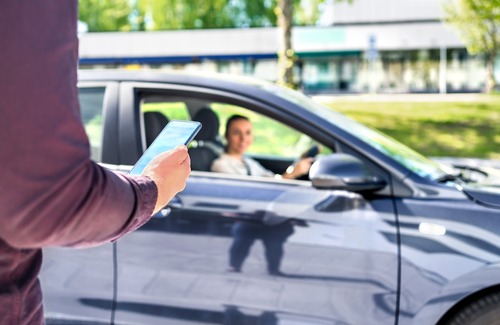At Connell Law Firm, we are a family-run personal injury law firm based in Lugoff, South Carolina. Since 1993, we have represented victims harmed by the wrongdoing and negligence of individuals, companies, and government agencies. Our attorneys have decades of collective experience and are committed to providing competent, passionate legal representation to all of our clients.
Rideshare services like Uber and Lyft have changed how people travel in South Carolina, but they have also added confusion to car accident claims. When a crash involves a rideshare vehicle, knowing who pays for injuries and damages depends on specific insurance requirements set by state law. These rules decide which insurance company is responsible and how much coverage is available.
In this blog, we explain how South Carolina’s insurance requirements impact rideshare accident claims, outline who may be held liable, and show how working with an experienced Camden rideshare accident attorney can help you recover the compensation you deserve.
Understanding South Carolina’s Rideshare Insurance Requirements
South Carolina law sets specific insurance requirements for rideshare drivers that affect accident claims and determine who pays for injuries and damages.
Insurance Requirements When the App is Off
When a rideshare driver is not logged into the app, the driver’s personal automobile insurance policy applies. In this phase, the rideshare company is not responsible for providing any coverage. The minimum insurance required by South Carolina law for personal vehicles is $25,000 for bodily injury per person, $50,000 per accident, and $25,000 for property damage, as stated in South Carolina Code § 38-77-140. If a car accident occurs during this time, any insurance claim must be filed through the driver’s personal insurer.
Insurance Coverage While the App is On Without a Passenger
When the rideshare driver is logged into the app but has not accepted a ride, the rideshare company must provide limited liability insurance. South Carolina Code § 58-23-1610 requires minimum amounts of $50,000 for bodily injury per person, $100,000 per accident, and $25,000 for property damage. This coverage applies only if the driver’s personal insurance does not pay. The driver must still carry their own insurance, but the rideshare company fills the gap if their policy does not cover the claim.
Insurance Policy During an Active Ride or En Route to a Passenger
Once the rideshare driver accepts a ride or is transporting a passenger, South Carolina law mandates $1 million in liability insurance. This includes coverage for bodily injury, property damage, and potential uninsured or underinsured motorists. This policy is paid by the rideshare company. If a rideshare accident occurs during this phase, injured parties can file a claim directly against this coverage. This is often where a rideshare accident lawyer becomes critical in pursuing full compensation for medical bills, lost wages, and other financial losses.
Importance of Understanding Coverage Limits
Each phase of the rideshare service comes with different insurance coverage and responsibilities. The phase determines which company pays and how much is available. Insurance companies often challenge claims based on when the accident occurred and which policy was active. Knowing these coverage limits helps riders, drivers, and passengers understand how to file an insurance claim and what compensation may be available under South Carolina law.
How Insurance Requirements Affect Rideshare Accident Claims
The insurance requirements set by South Carolina law directly influence who is responsible for covering damages after a rideshare accident.
Phase of the Ride Determines Coverage
The stage of the ride affects which insurance policy applies. If the driver is off the app, their personal automobile insurance is the only coverage available. When the app is on but no passenger is present, the rideshare company provides limited liability insurance. If the driver is on the way to pick up a rider or has a passenger in the vehicle, the rideshare company must provide up to $1 million in liability insurance. This coverage can include compensation for bodily injury, property damage, and lost wages.
Insurance Companies May Dispute Liability
Insurance companies often dispute claims based on the exact time and activity during the accident. They examine app data, ride status, and trip history to decide if the company’s coverage applies. In some cases, both the personal insurer and the rideshare company may deny responsibility, leaving the injured person caught in the middle. This is why proving when the accident occurred and which party was the at fault driver is essential for financial recovery.
Challenges for Injured Passengers and Drivers
Riders, drivers, and third parties involved in a rideshare accident may face delays in accessing coverage. Insurance companies may argue over who is responsible to pay, especially if fault is unclear or multiple vehicles were involved. Medical bills and property damage costs can grow quickly during these delays. A rideshare accident lawyer can review coverage limits and help pursue compensation from the correct insurer.
Importance of Filing a Clear Insurance Claim
An insurance claim must include key facts like the time of the crash, ride status, and details from the police report. Providing complete documentation reduces the chance of denial. Submitting accident forms quickly and following South Carolina law helps support your case. If the coverage is unclear, legal help can ensure your claim goes to the right insurer.
Who Is Liable? Fault and Financial Recovery
Liability in a rideshare accident depends on who caused the crash and what insurance coverage was active at the time.
South Carolina Uses an At-Fault System
South Carolina follows a fault-based system for car accidents. The at fault driver is financially responsible for damages, including bodily injuries, property damage, and lost wages. This means the injured party must prove who caused the accident. If a rideshare driver is at fault, the available coverage depends on their ride status. If a third-party driver caused the crash, that driver’s liability insurance should cover the losses.
Multiple Parties May Share Fault
In some rideshare accidents, more than one driver may be partially responsible. South Carolina uses modified comparative negligence rules. Under this law, you can recover damages if you are less than 51 percent at fault. Your compensation is reduced by your share of the fault. For example, if a rideshare driver is 30 percent responsible and another driver is 70 percent at fault, the rideshare company may still have to pay a portion of the damages.
Insurance Companies Examine Every Detail
Insurance companies investigate every detail to decide liability. They use the police report, vehicle data, and driver statements. If coverage is disputed, the insurance companies may delay payment or deny the claim. Clear documentation and accurate information help support your case. An experienced rideshare accident attorney can help prove fault and challenge any denial that is not supported by the evidence.
What Financial Recovery May Include
Financial recovery after a rideshare accident may include payment for medical bills, vehicle repair or replacement, lost wages, and other financial losses. These costs can be covered by the insurance policy that applies based on liability. The amount paid depends on the coverage limits and the degree of fault. Filing a strong insurance claim early improves your chances of full compensation under South Carolina law.
Why Legal Representation Matters
Rideshare accident claims involve multiple insurance policies and legal rules that can affect your ability to recover damages.
Insurance Companies Protect Their Own Interests
Insurance companies are trained to reduce payouts. They use adjusters, investigators, and legal teams to limit financial exposure. After an accident involving a rideshare vehicle, insurers may deny claims, delay responses, or offer low settlements. Without help, many people accept less than they deserve. A rideshare accident lawyer understands how insurers operate and can protect your rights.
We Understand South Carolina Rideshare Law
At Connell Law Firm, we have experience handling rideshare accident cases across South Carolina. We understand how state laws apply to rideshare insurance coverage. We know how to review app data, ride records, and insurance policies to determine which coverage applies. We also know how to hold both rideshare companies and at fault drivers accountable for financial losses.
We Help Maximize Your Claim
We calculate the full value of your insurance claim. This includes compensation for medical bills, lost wages, property damage, and pain resulting from the crash. We know how to request records, collect proof, and communicate with insurance companies. At Connell Law Firm, we make sure every claim is backed by evidence and filed within the time limits required by South Carolina law.
Our Consultation Is Free
If you were injured in a rideshare accident, we offer a free consultation to review your case. We represent clients in Camden and throughout South Carolina. We help you submit the right forms, meet legal deadlines, and seek full compensation. You do not have to face insurance companies alone. We are ready to fight for your recovery.
Contact an Experienced Camden Rideshare Accident Lawyer Today!
If you’ve been injured in a rideshare accident, it’s important to take action quickly. Delays can hurt your claim and make it harder to recover the compensation you need for medical bills, lost wages, and other financial losses. Our team at Connell Law Firm is here to help.
Contact us at [phone] for a free claim review today!




